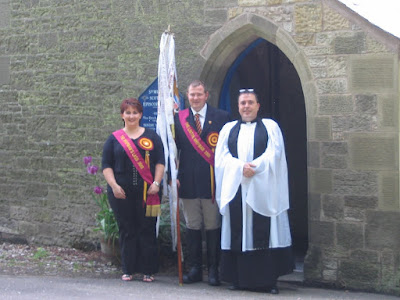The things you see from the train...
Especially when you *don't* have your camera with you!
I was riding on the train from Glasgow yesterday. It was about 1:30 in the afternoon. I was sitting at a table seat, facing the direction of travel ,and reading a course manual on church growth which I'd pinched for a few days from the Diocesan office. A bit bored. Reading a bit and looking out of the window from time to time. Suddenly we pass a grassy meadow in the very centre of which are three young women dressed all in black doing some sort of unison dance.
As I recall, the gal at the head of the line was fairly buxom and had a head of flaming red hair.
I looked across at the guy on the other side of the table. He was still reading his potboiler and obviously hadn't noticed. "Bubble bubble, boil and trouble" I muttered to myself.
Scotland's always had a spare witch or two - this must be some sort of resurgent ritual reserved for sunny Thursdays at the beginning of the warm weather.
And I went back to my reading.
Twenty minutes later I'm bored again by a lot of affirmations set out in bullet point form about 'thinking big' and 'bringing ministry to the people'. I look out the window.
This time we're passing through a planted field - filled with ankle deep somethingorother - and there's a young man dressed in a black suit with a waistcoat, wearing wellington boots and running with big hopping steps through that field waving at the train and carrying an open blue and white umbrella - all this on a sunny day.
Again - nothing from the bloke across from me reading his book and breathing through his mouth.
Why? I say to myself, feeling suddenly very uncomfortable.
I'm less prepared, now, to go home and say to my wife 'guess what I saw from the train today'.
I must assume that there is no guild of people planted along the train route between Glasgow and Falkirk High who fill their days by entertaining and confounding train passengers. Things aren't set up merely to present themselves to my consciousness. Whatever people are doing as you pass them on the train will doubtless have some logic of its own. But fecked if I know what it might be.
I worried Caireen would feel my forehead or wonder what my friend in Glasgow had put in the coffee he served me when we were meeting.
And she didn't think I'd gone nuts. Or at least if she did she didn't say.


























